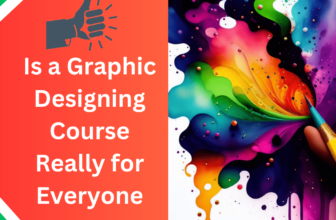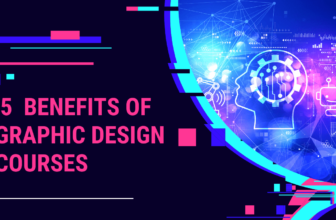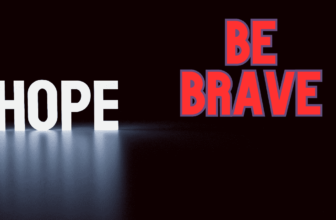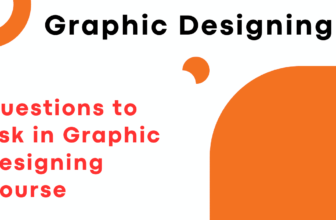
The world often mistakenly believes that graphic design is solely an extension of an artist’s raw, untrained talent—nothing more than the flick of a brush on a digital canvas. However, creativity and an in-depth understanding of structured techniques separate amateurs from seasoned designers. Secret techniques of top graphic designing courses aren’t simply a game of intuition. It’s a discipline. That’s right, mastering certain techniques can make or break your career. They make your designs visually appealing but also functional, efficient, and communicative.
IIn this blog post, we will unearth three secret techniques that are the linchpins of secret techniques of top graphic designing courses and, in turn, separate professionals from hobbyists.
Purpose
The goal is straightforward: to enlighten you about these pivotal secret techniques of top graphic designing courses and their multifaceted applications in the real world.
Table of Contents
Technique 1: Grid Systems
Introduction to Grid Systems
So, what exactly is a grid system? Think of it as the invisible skeleton of your secret techniques of top graphic designing courses. This horizontal and vertical lines network provides a structured layout where each element resides. Many iconic designs employ a grid system, whether Apple’s website or The New York Times front page.
Why It’s Taught in Top Courses
Grid systems are the unsung heroes of the secret techniques of top graphic designing courses. They bring order to chaos, offering the foundational building blocks in layout design. Professionals like Massimo Vignelli and Ellen Lupton don’t just praise it; their work serves as an ongoing case study of grid systems’ effectiveness.
How to Master Grid Systems
- Basic Principles: Familiarize yourself with the Rule of Thirds and the Golden Ratio. These principles will serve as your guiding light.
- Software Tools: Invest time in Adobe Illustrator, Sketch, and other design software that offer robust grid options.
- Hands-on Exercise or Tutorial: Create grids for simpler projects—a basic web page or a business card.
Real-world Applications
- Web design: A well-designed grid makes for easier navigation and a more pleasant user experience.
- Print media: Newspapers and magazines use grids to improve readability and layout.
- Mobile app UI/UX: Grids ensure the interface is visually appealing and user-friendly.
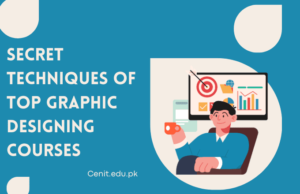
Technique 2: Color Psychology
Introduction to Color Psychology
Color isn’t just a visual element; it’s a psychological tool. Different colors evoke different emotions, influence perceptions, and play a pivotal role in branding and user experience.
Why It’s Taught in Top Courses
The power of color psychology lies in its ability to convey messages and elicit emotions, making it an indispensable part of branding and marketing campaigns.
How to Master Color Psychology
Basic Color Theories
Delve into color wheel theories and understand how primary, secondary, and tertiary colors interact.
Online resources and courses
Platforms like Coursera and Udemy offer comprehensive courses on color theory.
Hands-on Exercise
Practice picking a color scheme that aligns with a specific brand persona, say ‘youthful and energetic’ or ‘elegant and sophisticated.’
Real-world Applications
- Corporate branding: Colors build brand identity; think Coca-Cola red or Tiffany blue.
- Ad campaigns: A well-picked color scheme can make a campaign more effective.
- Interior design: Colors can set the mood of a room instantly.
Technique 3: Typography and Readability
Introduction to Typography
Typography is the art of arranging text. The use of typography can enhance readability and enhance user experiences.
Why It’s Taught in Top Courses
Good typography is a critical aspect of branding. It is pivotal in how engaged and informed your readers will be.
How to Master Typography
Fundamentals
Understand the nuances between font types and get the hang of line spacing and text hierarchy.
Software Tools
Tools like Adobe In secret techniques of top graphic designing courses Design and Font Forge can make your life much easier..
Hands-on Exercise
Try creating a readable and visually engaging layout for a blog post or a web page.
Real-world Applications
- Website design: Improve visitor engagement through easy-to-read fonts and layouts.
- eBook and print book layout: Enhance the reading experience with proper text arrangement.
- Logo designs: Typography can make or break a logo’s effectiveness.
Conclusion
We’ve touched on three foundational secret techniques of top graphic designing courses—Grid Systems, Color Psychology, and Typography. Additionally, these tools can improve your work quality. Mastering these techniques doesn’t mean stifling your creativity. Rather, they serve as controlled frameworks within which your creativity can flourish.
Frequently Asked Questions (FAQ’s)
What are these secret techniques of Top Graphic Designing Courses?
Discover exclusive design methodologies taught in leading courses to elevate graphic design skills.
Why are these techniques important?
These techniques offer insights into advanced design principles, helping you create more impactful and engaging visual content
Are these secret techniques of top graphic designing courses suitable for beginners?
While some familiarity with graphic design is helpful, these courses often cater to various skill levels, including intermediate and advanced designers.
How can I access these courses?
Access these courses online through platforms or websites offering comprehensive design education.
How do these techniques enhance my graphic designing skills?
These techniques delve into advanced concepts like typography manipulation, 3D rendering, and visual storytelling, taking your skills to the next level.


